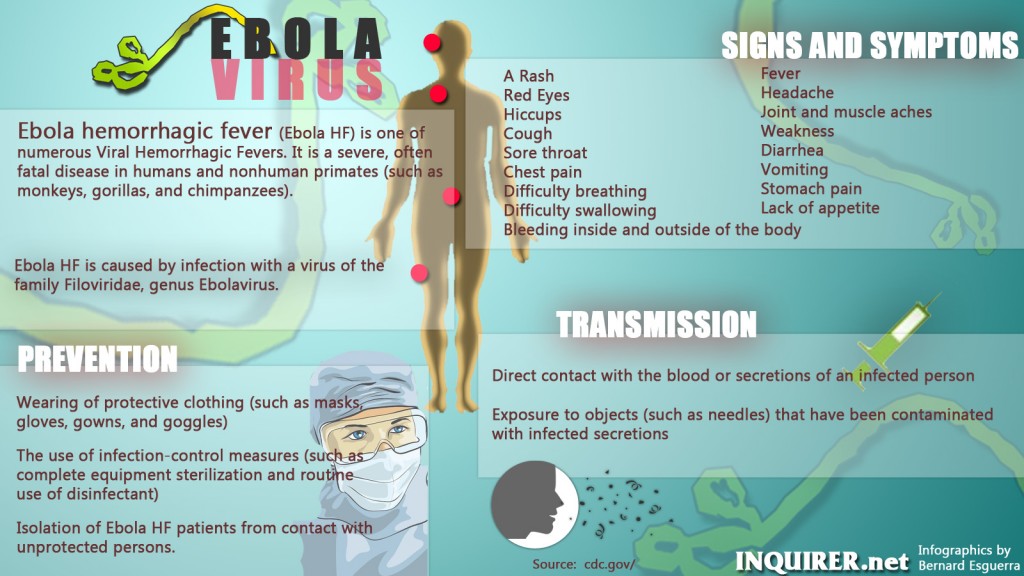MANILA, Philippines—The Department of Health (DOH) on Friday said it is closely monitoring seven out of 15 overseas Filipino workers who had returned to the country from Sierra Leone for any symptoms of Ebola virus infection which had killed hundreds in West Africa.
Sierra Leone has declared a state of emergency as the virus has infected more than 1,300 people since the start of the year and killed more than 720 people in West Africa.
Health Secretary Enrique Ona urged returning Filipinos who experience sore throat, fever, headache, intense weakness, and joint and muscle pains to immediately seek help from local health authorities in the country where they are employed before flying back to the Philippines.
But Ona assured the public that the Philippines remains “Ebola-free.”
Ebola is an infectious, often fatal, disease in humans and primates, such as monkeys, gorillas and chimpanzees. There is no vaccine available yet for its treatment.
“Health authorities in the country are not letting their guard down on the possible entry of any emerging infectious disease,” Ona said.
The Department of Foreign Affairs has raised Alert Level 2 in three countries experiencing outbreaks of Ebola infection–Guinea, Sierra Leone and Liberia. Filipino workers with new contracts in the said countries were not allowed to leave the Philippines.
Ona said the Health Emergency Management Staff of the DOH is monitoring daily the health condition of the seven overseas workers, who arrived between June 26 and July 15, from Sierra Leone.
The DOH also directed Regional health officials to stand by in case a returning overseas Filipino worker will be found to have symptoms of the Ebola disease. They have been tasked to be in charge of the admission of patients to the nearest government hospital.
Health care and laboratory workers exposed to secretions and specimens from infected individuals are most at risk to contract Ebola, said Ona.
“Proper coordination of Philippine labor officials (Department of Labor and Employment, Philippine Overseas Employment Administration, Overseas Workers Welfare Association) is now being undertaken with the DFA and the Bureau of Immigration, for possible repatriation,” he added.
To those who are prone to the infection, the health secretary advised them to:
- Avoid close contact with infected patients;
- Avoid consumption of the raw meat of possible infected animals like fruit bats, monkeys or apes;
- Wear gloves and appropriate personal protective equipment when taking care of ill patients at home;
- Wash hands after visiting sick relatives in the hospital and after taking care of ill patients at home.
The DOH also enumerated the signs and symptoms of infection with Ebola virus including:
- Fever
- Headache
- Intense weakness
- Joint and muscle pains
- Sore throat
If it worsens, it might be followed by:
- Vomiting
- Diarrhea
- Stomach pain
- Rash
- Impaired kidney and liver function, and in some cases, both internal and external bleeding;
- sometimes, rash, red eyes, hiccups
- bleeding from body openings
RELATED STORIES
PH peacekeepers in Liberia told to restrict movements amid ebola outbreak
Originally posted: 4:08 pm | Friday, August 1st, 2014
